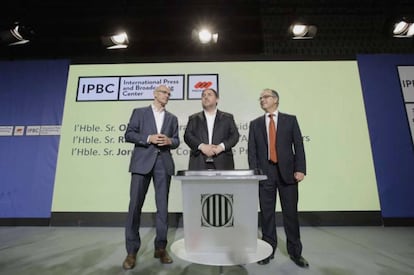Catalan government promises 2,315 voting stations and 7,235 volunteers
Ballot boxes are translucent plastic containers apparently sourced from a company in China
At a press conference in Barcelona today, the Catalan government laid out its plans for a referendum in the northeastern region on independence scheduled for Sunday, and which has been declared illegal by the Spanish Constitutional court.

Despite mounting pressure from the central government in Madrid and the courts aimed at shutting down the poll, the regional government defiantly announced on Friday that a total of 2,315 polling places would be operating throughout the region, with 6,299 voting stations and 7,235 people “involved” in guaranteeing that the day passes without incident, Catalan government spokesperson Jordi Turull explained to reporters.
On Sunday there will be a vote, people will be able to do so from 9am until 8pm
Regional spokesperson Jordi Turull
“On Sunday there will be a vote, people will be able to do so from 9am until 8pm,” he added. Turull stated that a total of 5,343,358 people had been invited to participate. “Everyone should stay calm – we will be able to vote,” he explained. A total of 207 polling places will be located in the Catalan capital, Barcelona.
The presentation took place at the International Press and Broadcasting Center (IPBC), a private international press center that is charging journalists €10 a day for entry to attend press conferences about the referendum. The result of the poll is also due to be announced there on Sunday.
Also making a surprise appearance at Sunday’s press conference were deputy regional premier Oriol Junqueras and regional foreign chief Raül Romeva. The politicians also presented the ballot boxes that are to be used at the polling stations. “If anyone tries to stop a station from operating, citizens will also be able to vote,” Junqueras stated several times.
The deputy premier said that after the referendum, “there will have to be respect for the mandate of citizens,” but did not specify how many votes and how many active polling stations would be sufficient for the vote to be considered valid. The referendum law that was fast-tracked through the regional parliament earlier this month states that the Catalan government will declare independence if there are more yes votes than no.
The referendum law states that the Catalan government will declare independence if there are more yes votes than no
One of the key obstacles faced by the Catalan regional government has been how it will source ballot boxes for the vote, given that it is unable to access the usual, see-through boxes used in regular elections in Spain. That problem appears to have been solved by turning to a Chinese company, Smart Dragon Ballot Expert, which manufactures the translucent plastic containers that were presented to reporters on Friday.
The white box with black lid displayed by the politicians carried the logo of the regional government, and was shown along with red zip ties that will be used to seal them.
According to Sally Liang, a sales representative for the Chinese company, the firm recently sent 10,000 boxes to France, but not to Spain. The company has supplied ballot boxes since 2008 for countries such as Australia, Chad, Ghana and Nigeria. The only European country with which it has worked is Lithuania.
The decree containing complementary laws for the holding of the referendum published by the regional government on September 7 did not specify that the ballot boxes had to be transparent.
Data-protection fines
Meanwhile, on Friday the state Data Protection Agency warned Catalan citizens that anyone manning polling stations at the illegal referendum on Friday would face fines for possible infractions related to the fraudulent handling and assignment to third parties of the electoral census.
In a statement, the agency pointed out that those manning polling stations would not be considered members of an electoral body, given that the vote has been suspended by the Constitutional Court. They would instead be receiving information about the census as private citizens.
The Data Protection Agency pointed out that the “treatment and assignment of data without permission can incur fines of between €40,001 and €300,000”
The Data Protection Agency pointed out that the “treatment and assignment of data without permission […] can incur fines of between €40,001 and €300,000.”
The state agency – which is independent from the government, but linked to the Justice Ministry – issued the warning “given the requests for information received by citizens who have been summoned [by the regional government] to man the polling stations.”
English version by Simon Hunter.
Tu suscripción se está usando en otro dispositivo
¿Quieres añadir otro usuario a tu suscripción?
Si continúas leyendo en este dispositivo, no se podrá leer en el otro.
FlechaTu suscripción se está usando en otro dispositivo y solo puedes acceder a EL PAÍS desde un dispositivo a la vez.
Si quieres compartir tu cuenta, cambia tu suscripción a la modalidad Premium, así podrás añadir otro usuario. Cada uno accederá con su propia cuenta de email, lo que os permitirá personalizar vuestra experiencia en EL PAÍS.
¿Tienes una suscripción de empresa? Accede aquí para contratar más cuentas.
En el caso de no saber quién está usando tu cuenta, te recomendamos cambiar tu contraseña aquí.
Si decides continuar compartiendo tu cuenta, este mensaje se mostrará en tu dispositivo y en el de la otra persona que está usando tu cuenta de forma indefinida, afectando a tu experiencia de lectura. Puedes consultar aquí los términos y condiciones de la suscripción digital.








































